Gender equality, also known as sexual equality or equality of the sexes, is the state of equal ease of access to resources and opportunities regardless of gender, including economic participation and decision-making; and the state of valuing different behaviors, aspirations and needs equally, regardless of gender.
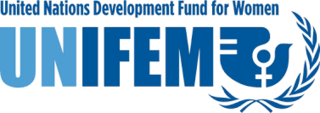
The United Nations Development Fund for Women was established in December 1976 originally as the Voluntary Fund for the United Nations Decade for Women in the International Women's Year. Its first director was Margaret C. Snyder. UNIFEM provided financial and technical assistance to innovative programmes and strategies that promoted women's human rights, political participation and economic security. Since 1976 it supported women's empowerment and gender equality through its programme offices and links with women's organizations in the major regions of the world. Its work on gender responsive budgets began in 1996 in Southern Africa and expanded to include East Africa, Southeast Asia, South Asia, Central America and the Andean region. It worked to increase awareness throughout the UN system of gender responsive budgets as a tool to strengthen economic governance in all countries. In 2011, UNIFEM merged with some other smaller entities to become UN Women.
Islamic feminism is a form of feminism concerned with the role of women in Islam. It aims for the full equality of all Muslims, regardless of gender, in public and private life. Islamic feminists advocate women's rights, gender equality, and social justice grounded in an Islamic framework. Although rooted in Islam, the movement's pioneers have also utilized secular, Western, or otherwise non-Muslim feminist discourses, and have recognized the role of Islamic feminism as part of an integrated global feminist movement.
Equality Now is a non-governmental organization founded in 1992 to advocate for the protection and promotion of the human rights of women and girls. Through a combination of regional partnerships, community mobilization and legal advocacy the organization works to encourage governments to adopt, improve and enforce laws that protect and promote women and girls' rights around the world.
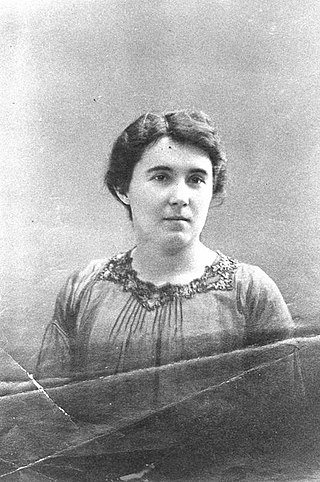
Alicia Moreau de Justo was an Argentine physician, politician, pacifist and human rights activist. She was a leading figure in feminism and socialism in Argentina. Since the beginning of the 20th century, she got involved in public claims for opening rights for women. In 1902, joined by a fellow activists, she founded the Feminist Socialist Center of Argentina and the Feminine Work Union of Argentina.
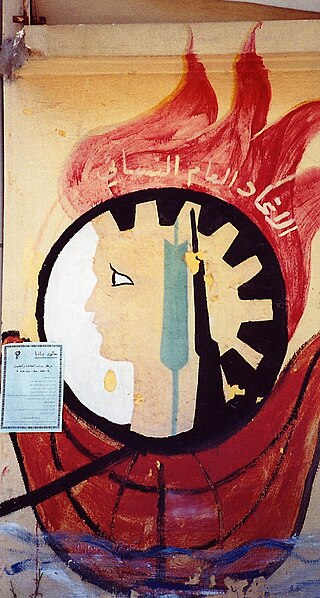
The General Union of Syrian Women (GUSW) was founded in 1967 with Saud al Abdallah serving as the original president. It aimed to mobilize women while developing their education, political activism, and skills that helped women become more effective members in socio-economic settings. While Syrian women have historically held more rights when compared to the rest of the Arab world, the GUSW is working to put an end the isolation and marginalization of Syrian women as well as involve women to become more of an effective population in society. This movement was born out of the unification of various welfare associations, volunteer organizations, and welfare groups caused by various political shifts in Syria.

Human rights in Somalia throughout the late 20th-century and early 21st-century were considered dire, but have gradually improved over the following years. Human rights are guaranteed in the Federal Constitution, which was adopted in August 2012. They fall under the Ministry of Human Rights established in August 2013. The central authorities concurrently inaugurated a National Human Rights Day, endorsed an official Human Rights Roadmap, and completed Somalia's first National Gender Policy.

The roles of women in Lebanon have evolved throughout history. The legal status of women transformed over the 20th century, but traditional patriarchal norms and conservative versions of Islamic law continue to influence women's rights in Lebanon.

The Norwegian Association for Women's Rights is Norway's oldest and preeminent women's and girls' rights organization and works "to promote gender equality and all women's and girls' human rights through political and legal reform within the framework of liberal democracy." Founded in 1884, NKF is Norway's oldest political organization after the Liberal Party. NKF stands for an inclusive, intersectional and progressive mainstream liberal feminism and has always been open to everyone regardless of gender. Headquartered at Majorstuen, Oslo, NKF consists of a national-level association as well as regional chapters based in the larger cities, and is led by a national executive board. NKF has had a central role in the adoption of all major gender equality legislation and reforms since 1884.
Tuvalu is a small island nation in the South Pacific, located North of Fiji and North West of Samoa. The population at the 2012 census was 10,837. Tuvalu has a written constitution which includes a statement of rights influenced by the United Nations Universal Declaration of Human Rights and the European Convention on Human Rights. While most human rights in Tuvalu are respected, areas of concern include women’s rights and freedom of belief, as well as diminishing access to human rights in the face of global warming. The latter has played a major role in the implementation of human rights actions in Tuvalu given its geographical vulnerability and scarce resources.

Human rights in Iraqi Kurdistan refer to the human rights issue in the autonomous area of Kurdistan Region.

Women played a variety of roles in the Arab Spring, but its impact on women and their rights is unclear. The Arab Spring was a series of demonstrations, protests, and civil wars against authoritarian regimes that started in Tunisia and spread to much of the Arab world. The leaders of Tunisia, Egypt, Libya, and Yemen were overthrown; Bahrain has experienced sustained civil disorder, and the protests in Syria have become a civil war. Other Arab countries experienced protests as well.
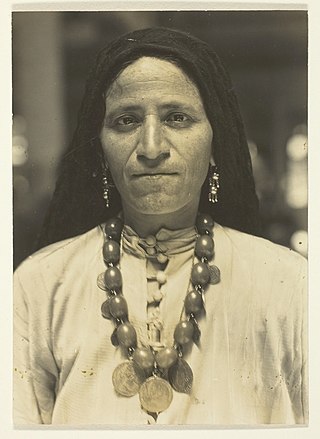
Women in Syria constitute 49.9% of Syria's population. According to World Bank data from 2021, there were around 10.6 million women in Syria. They are active participants not only in everyday life, but also in the socio-political fields. Syrian women and girls still experience challenges in their day-to-day lives, for example in the area of law and health care.
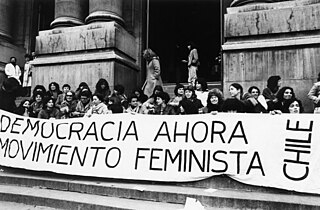
Feminism in Chile has its own liberation language and activist strategies for rights that is shaped by the political, economic, and social system of Chile. Beginning in the 19th century, Chilean women have been organizing with aspirations of asserting their political rights. These aspirations have had to work against the reality that Chile is one of the most socially conservative countries in Latin America. The Círculo de Estudios de la Mujer is one example of a pioneering women's organization during the Pinochet dictatorship (1973–1989) which redefined women's responsibilities and rights, linking “mothers’ rights” to women's rights and women's civil liberties. The founding members of the Círculo de Estudios de La Mujer consisted of a small group of Santiago feminists who were from the Academia de Humanismo Cristiano. These women gathered "to discuss the situation of women in Chile," their first meeting drew a crowd of over 300 participants and from there challenged the authoritarian life in Santiago. These women helped shape the rights for women in Chile.

Hanaa Edwar is an Iraqi women's rights activist. She is the founder and general secretary of Iraqi Al-Amal Association, and co-founder of the Iraqi Women's Network.
As of 2018, the African country Rwanda ranks in the top five countries for gender equality according to the Global Gender Gap Report. The idea of fairness that dominates this country arose after the genocide against the Tutsi that occurred in 1994. The government is committed to ensuring equal rights for women and men without prejudice to the principles of gender equality and complementarity in national development. These ideas are exhibited through the roles of Rwanda women in government, the respect for women's education and the role of women in Rwanda healthcare. The country also took an active stance against rape in genocide, created a national action plan after United Nations Resolution 1325, and is pushing towards ending gender-based violence.
Foreign aid for gender equality in Jordan includes programs funded by governments or non-governmental organizations (NGOs) that aim to empower women, close gender based gaps in opportunity and experience, and promote equal access to education, economic empowerment, and political representation in the Hashemite Kingdom of Jordan.

Basic human rights in Italy includes freedom of belief and faith, the right of asylum from undemocratic countries, the right to work, and the right of dignity and equality before the law. Human rights are the basic rights of every citizen in every country. In Italy, human rights have developed over many years and Italy has education on human rights. In addition, Italy has specific human rights for women, children and LGBT people.
Women and Gender Equality Canada, known as Status of Women Canada from 1976 to 2018, is a department of the Government of Canada. Previously an agency under the Department of Canadian Heritage, it gained department status after a vote in December 2018 passed the Budget Implementation Act, 2018, No. 2, which included legislation in favour of evolving the agency into a department and increasing its power, duties, and functions to those concerning not just women, but all gender identities. The purpose of the department is to "advance equality with respect to sex, sexual orientation, and gender identity or expression through the inclusion of people of all genders, including women, in Canada's economic, social, and political life" as well as the intersection of these with other identities such as ethnicity, age, socio-economic level, disability, and others. The department partners with other areas of government, both federal and provincial, as well as civil and private organizations in order to achieve this. It is currently headed by the Minister for Women and Gender Equality, Marci Ien.
Feminist foreign policy, or feminist diplomacy, is a strategy integrated into the policies and practices of a state to promote gender equality, and to help improve women's access to resources, basic human rights, and political participation. It can often be bucketed into three categories: rights, resources, and representation. The concept was first coined and integrated into governmental policy by Margot Wallström, former Swedish Foreign Affairs Minister.











